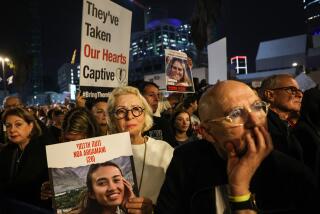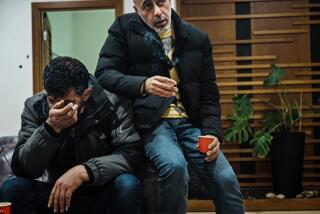A death in Iraq, grief in Glendale
- Share via
Peter Dishchekenian went to meet his parents at the airport early this week, wondering how to tell them the horrible news.
He couldn’t do it when they arrived -- his father, a retired computer programmer, was too happy, glowing after a two-week trip to Armenia.
So Peter, 31, drove them home to Glendale first and sat them down in the living room.
“There was a tragic accident in Iraq,” he said in their native Armenian, his voice cracking. “It involved some contractors and Aunt Maro. She passed away.”
Daniel Dishchekenian, 62, repeated his sister’s name, Maro. Then he stared at the floor. After a while, he put his hand over his eyes, and he began to weep.
Marani “Maro” Ohannes, 48, a mother of three living in Baghdad, was shot by private security guards Oct. 9 while ferrying neighbors home from church.
Dishchekenian had not seen his sister, a former scientist for Iraq’s Agriculture Ministry, in almost 30 years. He thought he had time, that the U.S. invasion would stabilize the country and allow the family to reunite in their hometown of Basra in the south. Now he’s desperate to rescue Ohannes’ three daughters, his brother and another sister from Iraq before they too become casualties.
“We are working to get them out at any price,” he said.
Private security companies in Iraq have been drawing criticism since employees of Blackwater USA, hired by the U.S. government, opened fire in a Baghdad square last month, killing 17 Iraqis. Blackwater said its personnel had come under attack, but Iraqis said the Blackwater guards began the shooting. The incident is under investigation.
The guards who killed Ohannes were employed by an Australian company based in the United Arab Emirates, Unity Resources Group, also hired to protect U.S. contractors.
Daniel Dishchekenian was born in Iraq but considers himself an Armenian American. As an American citizen, he was stunned to hear that his sister had been killed to protect a U.S. convoy. He fears the significance of her death will be lost on most Americans accustomed to a daily death toll of Iraqis killed in Baghdad.
Ohannes was the baby, the sister he grew up with in a one-room mud house. Their father, a shoemaker, built the house by hand after he was forced to flee Turkey in the mass relocations of Armenians in 1915.
She struggled like the rest of her eight siblings to graduate from college, then stayed home to care for her ailing parents and husband while other relatives fled the country. Two years ago her husband died, leaving her to support daughters Nora, 20, Karon, 18, and Alice, 13.
Ohannes never asked for help, Dishchekenian said, but he called and sent money anyway.
The last time he talked to her on the phone a few months ago, she and her girls sounded scared.
“They didn’t feel safe,” he said. “It was not only the security people but the insurgents. The fear was there always.”
Dishchekenian tries to imagine how his sister died. He has seen photographs of her white 1990 Oldsmobile after the shooting, the driver’s side door dripping with blood. He keeps a copy of the photos that ran in an Armenian newspaper.
His brother Albert Dishchekenian, 55, and sister Ana Sahak, 53, who live in Iraq, told him that Ohannes was driving back from church with a woman riding beside her and two children in the back seat when security contractors fired a machine gun at them. When Albert Dishchekenian and Sahak claimed Ohannes’ body from police afterward, it was riddled with bullets. Her passenger Geneva Jalal, 30, also was killed.
Leedya Sargis, Ohannes’ sister-in-law, said the family tried to contact Unity, but did not receive a response.
Unity contends that the contractors tried to warn Ohannes to stay back with signs, strobe lights, hand signals and a flare before shooting.
“The vehicles did not heed these warnings and failed to stop,” the company said in a statement. “Fearing a suicide attack, only then did the team use their weapons in a final attempt to stop the vehicle.”
Dishchekenian can’t understand why a contractor would shoot at a car full of women and children. “I don’t know how much our country, the soldiers, knew about this company. They are well trained or not?” he said while drinking strong Armenian coffee in his living room this week, surrounded by family photographs. “In my mind, it’s not very professional.”
He wishes he could have attended his sister’s funeral last week at an Armenian church in Baghdad, but knows it would have been too dangerous.
“They know you are American, and you can be kidnapped,” he said. “That won’t help anything.”
A relative in Baghdad was recently kidnapped and released only after the family paid $50,000 ransom.
Dishchekenian called his nieces this week and could hear them crying. He told them his thoughts were with them. Anything they need, he’ll find a way to get it. He and his younger brother Paul Manook, 57, in London are trying to get them visas so they can come live in the U.S. or United Kingdom.
“Don’t think you are forgotten,” he said.
Four families of those killed in the Blackwater shooting last month filed a lawsuit Thursday against the company in U.S. federal court in Washington, seeking unspecified damages.
On Tuesday, Dishchekenian called the father of the passenger who was killed with his sister, Jalal Antranik of Denver, who said he planned to hire the same Philadelphia law firm that’s handling the Blackwater cases so he can sue Unity.
Like Dishchekenian, Antranik is also trying to rescue relatives stuck in Baghdad, and worries about Ohannes’ children.
“Anything could happen,” he said.
Every day, Ohannes’ daughters gather with relatives in Baghdad to mourn, console one another and count the days since her death. In Glendale, Dishchekenian is also counting the days.
It is Armenian tradition to remember lost loved ones with multiple memorials -- at three days, 40 days and a year after they die. Relatives usually gather and share a meal of the departed’s favorite foods.
Dishchekenian missed his sister’s first memorial in Baghdad. The priest at St. Gregory the Illuminator Armenian Apostolic Church in Pasadena mentioned her passing Sunday, but Dishchekenian was at the airport and missed that too.
He plans to hold a 40-day memorial in Glendale starting next month. Most of his family won’t be there, and he can’t remember his sister’s favorite foods. But he will make do.
Maybe by next year, he says, they can have a proper memorial, the whole family together. By then, he figures, it won’t matter that he can’t remember what to serve. With luck, Ohannes’ daughters will have arrived.
--
molly.hennessy-fiske@ latimes.com
More to Read
Sign up for Essential California
The most important California stories and recommendations in your inbox every morning.
You may occasionally receive promotional content from the Los Angeles Times.











